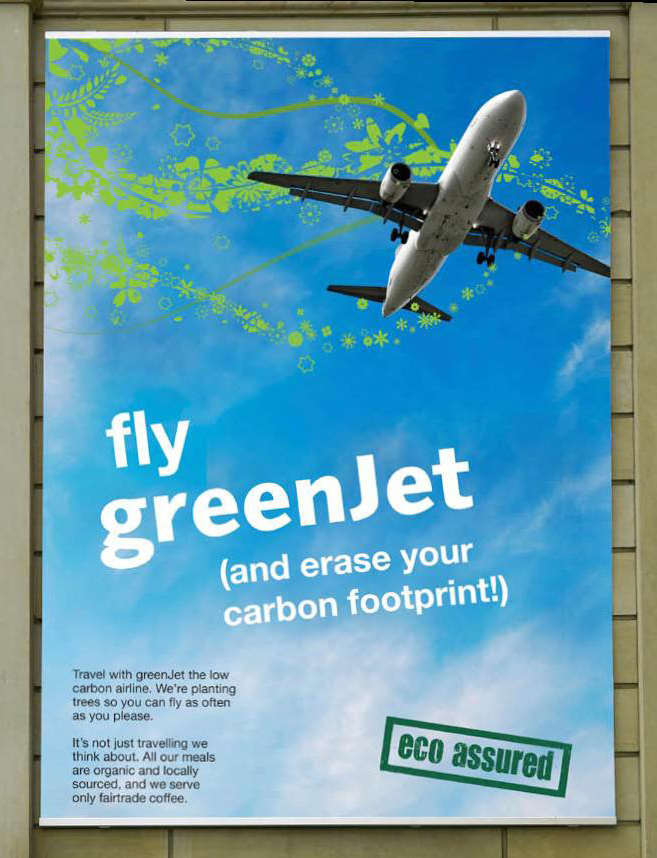You all know what greenwash is, I’m sure: ”Disinformation disseminated by an organization so as to present an environmentally responsible public image” will serve as a pretty good basic definition.
Basically, companies lie to you. I mean, companies lie to us all the time – it’s called marketing – but when they mislead customers in a way that causes them to make choices that are bad for the environment, I take that personally.
Because air travel is not sustainable, the companies who offer us air travel have to greenwash extra hard. Notorious among them was greenJet. Remember this?

Quick question while we consider that one: what the heck does “eco assured” signify, and what body provides such assurances? Study the poster as carefully as you like, but you aren’t going to find the answer. Futerra (2008) made an example of greenJet, putting an end to that particular scam… but what’s this I see?

It’s all over the travel industry’s news feeds. There are too many sources to reference, quite frankly.
To think that Aer Lingus are somehow managing to carry a full load of passengers on this airborne miracle factory of theirs: it’s astounding! At least, it would be astounding if their press release used the same definition of recycling as my dictionary.
Recycling: the action or process of converting waste into reusable material.
– Oxford Dictionary of English
How does one go about making reusable material from waste? It’s not easy. How would you recycle a drink can, for instance? The melting point of aluminum is 660.32 degrees Celsius (1,220.6 degrees Fahrenheit), so if Aer Lingus are recycling waste onboard, they’ve somehow found a way to smelt aluminium safely, on an aircraft that’s made of the same material and filled with flammable things like jet fuel and passengers. They’d also need a plant to pulp waste paper and form it into fresh sheets of material, and another to shred plastic waste (of various types) into pellets. For extra credit, add a machine that crushes glass bottles to produce cullet.
Or… no, surely not! Don’t tell me that they consider recycling to mean “sorting our rubbish into separate bins and leaving all the hard work to somebody else.”
Of course, that’s exactly what they mean: segregating waste and then forwarding it to their partner, Panda. Not to criticise Panda, here, because they’re the ones doing all the actual recycling. Aer Lingus, I suspect, are merely asking passengers to put their rubbish into the right bin or bag, mid-flight.
It gets worse. “The airline is set to recycle approximately 20 percent (200 tonnes) of onboard waste by the end of this year,” gushes one of the many articles about this milestone in sustainable aviation (Philp, 2023).
Twenty percent. A fifth… by the end of the year. On short-haul flights into Ireland. Could a green aspiration be more humble than this? More pathetic in scope? Hardly. No doubt they’d say that it’s better than nothing and they’re the leading the industry… but whataboutism remains as hollow as ever – and as Futerra would be quick to point out, being the best in a terrible industry isn’t a sound basis for a green claim.
Please keep in mind that this is an article about the litter in an aircraft cabin on a short-haul flight. It says nothing about the tonnes of Jet A-1 consumed by the engines on every flight, presumably because that impact remains the same as before – and far, far greater than the impact of a little bit of rubbish going to landfill. But don’t look at that! Look over here at our whizzy success story…
Yup! Greenwash strikes again.
Shame on you, Aer Lingus – and on all the dim journalists who parrot such obvious nonsense.
References:
Futerra Sustainability Communications (2008). The greenwash guide. London: Futerra Sustainability Communications.
Philp, S. (2023, July 18). Aer Lingus now recycling onboard. PAX International, July 18th 2023. Available online: https://www.pax-intl.com/passenger-services/terminal-news/2023/07/18/aer-lingus-now-recycling-onboard/ (date accessed: 20/07/2023)
